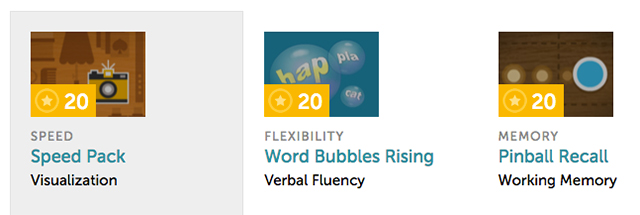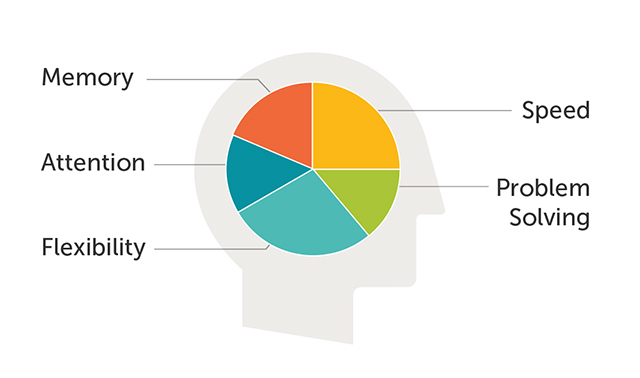Have you tried Lumosity for soothing ADHD?
Can brain training games really have a positive effect on the classic symptoms of inattentiveness?
Enter Lumosity, an online app that was launched in 2007.
Lumosity has received widespread acclaim — and scrutiny — for its series of brain training games, which the company, Lumos Labs, alleges can improve memory, attention, flexibility, speed of processing, and problem solving.
Imagine we could download a simple app, play a series of puzzles, and then see an improvement to vital skills that are traditionally hindered by ADHD.
It’s an intoxicating idea, right?
One that might sound too good to be true.
As the popularity of brain training computer games for ADHD has grown, the conversation has changed to whether they actually work, and how far the benefits extend.
Lumosity certainly has history for exaggerating its marketing claims…
“Lumosity preyed on consumers’ fears about age-related cognitive decline, suggesting their games could stave off memory loss, dementia, and even Alzheimer’s disease,” said Jessica Rich, Director of the FTC’s Bureau of Consumer Protection. “But Lumosity simply did not have the science to back up its ads.”
Source: FTC Settlement.
…but there is no disputing the number of blog posts and forum threads from ADHD and ADD users who claim a tangible benefit from using Lumosity.
It doesn’t harm Lumosity that the software is well designed and stacked with high-quality games; the likes of which many of us would play anyway, regardless of the brain benefits.
What Games are on the Lumosity App?

We counted over sixty games on the Lumosity app.
They seem to appear weekly, an endless factory line of new brainteasers where you can record your best score and then try to beat it through cognitive training.
Some of these are simple ‘play once and forget’ exercises, others are teasing challenges with intricate variables that can give them an addictive quality.
Each game comes with a primary skill that it claims to ‘improve’.
These skills include:
- Visualization
- Verbal fluency
- Working memory
- Field of view
- Selective attention
- Planning
- Information processing
- Divided attention
- Task switching
- Quantitative reasoning
- Response inhibition
- Spatial recall
- Spatial orientation
- Face-Name recall
- Logical reasoning
…Nevermind ADHD. If Lumosity truly delivers on improving each of these skills, it should be crowbarred in to the entire school system from Day 1.
We’ll take entire lot, thank you very much!
Alas…
The games are good fun — even great fun at times — but the app has to go further than mild enjoyment to justify a premium subscription for its alleged brain benefits.
What about the underlying science?
Does the Science Back Lumosity’s Claims?

Being one of the most popular brain training tools on the market, Lumosity has received plenty of attention in the press. A number of studies have delved in to its potential benefits.
Two notable studies, by Dr. Jordan Gaines Lewis and Lauren Friedman of Business Insider, came back with a mixed view on whether Lumosity truly benefits the brain.
The main problem cited is the lack of evidence that skills practiced on Lumosity can be transferred to other areas of life.
Lumosity promises that it will improve your life quite broadly, but it’s more likely that it will just make you better at certain narrow tasks — like playing the games themselves.
Source: Business Insider
The study goes on to say:
There’s some evidence that it can produce “short-term, specific training effects that do not generalize” — a small (if fleeting) boost to your working memory capacity, for example. But this can hardly be confused with achieving your “full potential.”
In other words… Don’t expect a miracle.
A caveat to these studies is that they do not focus on our question — does Lumosity help for ADHD?
Especially given that it caters to skills where ADHD sufferers are often seen to be lacking: problem solving, memory and attention.
Sadly, there has been very little research in to the benefits of Lumosity for treating ADHD.
We suspect that the application of cognitive skills on a daily basis may have a greater benefit for somebody suffering from ADHD than for somebody who isn’t.
Pure speculation, though.
Whatever the case, practicing vital skills — such as memory and attention to detail — is unlikely to have a negative effect. Even if the promised results of a ‘new and improved you’ are unlikely to manifest in the way that Lumosity markets its products.
Give it a go.
Let us know what you think.
Have you tried Lumosity? Did it have a tangible effect on any ADHD symptoms?